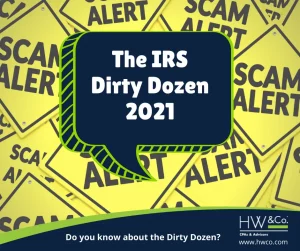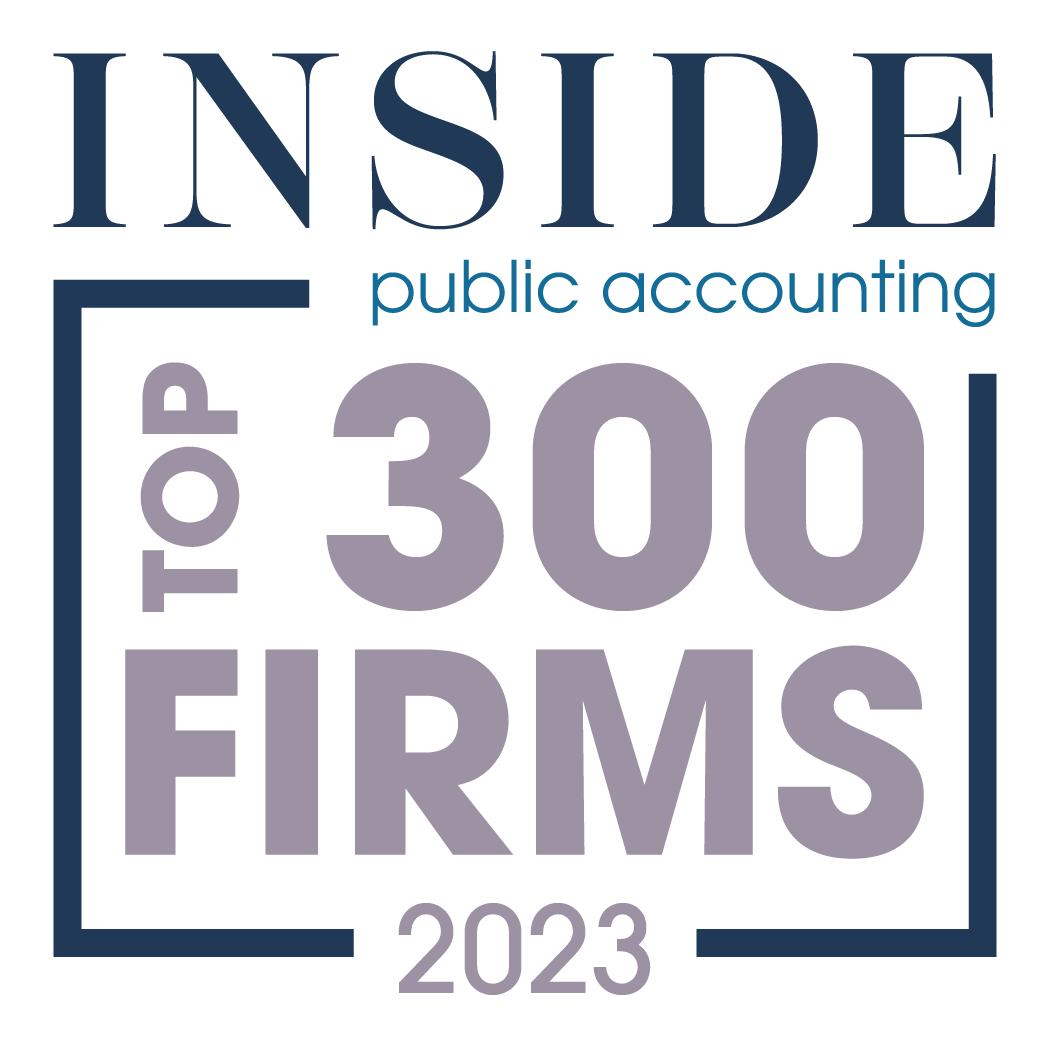 Yesterday, we presented the 2nd installment of the IRS’ Dirty Dozen 2021, revealing scams that use email, text, social media messages, or phone calls to get personal information, with the end goal of tax-related identity theft.
Yesterday, we presented the 2nd installment of the IRS’ Dirty Dozen 2021, revealing scams that use email, text, social media messages, or phone calls to get personal information, with the end goal of tax-related identity theft.
Today, HW&Co. is going over scams targeting the most unsuspecting victims and tricking them into doing something illegal or which ultimately causes them harm.
Several schemes involve fraudsters targeting groups like seniors or immigrants, posing as fake charities impersonating IRS authorities, charging excessive fees for Offers in Compromise, conducting unemployment insurance fraud and unscrupulously preparing tax returns.
Here are five more of this year’s “Dirty Dozen” scams.
7. Fake charities
The IRS advises taxpayers to be on the lookout for scammers who set up fake organizations to take advantage of the public’s generosity. They especially take advantage of tragedies and disasters, such as the COVID-19 pandemic.
Taxpayers who give money or goods to a charity may be able to claim a deduction on their federal tax return by reducing the amount of their taxable income. But taxpayers should remember that to receive a deduction, taxpayers must donate to a qualified charity. To check the status of a charity, use the IRS Tax Exempt Organization Search tool.
Here are some tips to remember about fake charity scams:
- Individuals should never let any caller pressure them. A legitimate charity will be happy to get a donation at any time, so there’s no rush. Donors are encouraged to take time to do the research.
- Potential donors should ask the fundraiser for the charity’s exact name, web address and mailing address, so it can be confirmed later. Some dishonest telemarketers use names that sound like large well-known charities to confuse people.
- Be careful how a donation is paid. Donors should not work with charities that ask them to pay by giving numbers from a gift card or by wiring money. That’s how scammers ask people to pay. It’s safest to pay by credit card or check — and only after having done some research on the charity.
For more information about fake charities see the information on fake charity scams on the Federal Trade Commission web site.
8. Immigrant/senior fraud
IRS impersonators and other scammers are known to target groups with limited English proficiency as well as senior citizens. These scams are often threatening in nature.
While it has diminished some recently, the IRS impersonation scam remains a common scam. This is where a taxpayer receives a telephone call threatening jail time, deportation or revocation of a driver’s license from someone claiming to be with the IRS. Taxpayers who are recent immigrants often are the most vulnerable and should ignore these threats and not engage the scammers.
The IRS reminds taxpayers that the first contact with the IRS will usually be through mail, not over the phone. Legitimate IRS employees will not threaten to revoke licenses or have a person deported. These are scare tactics.
Seniors beware
Senior citizens and those who care about them need to be on alert for tax scams targeting older Americans. The IRS recognizes the pervasiveness of fraud targeting older Americans and makes an effort to make filing taxes easier for seniors, the IRS reminds seniors born before Jan. 2, 1956 that the IRS has re-designed the Form 1040 and its instructions, and that they can use the Form 1040SR and related instructions.
The IRS reminds seniors that the best source for information about their federal taxes is the IRS website.
9. Offer in Compromise “mills”
An “offer,” or OIC, is an agreement between a taxpayer and the IRS that resolves the taxpayer’s tax debt. The IRS has the authority to settle, or “compromise,” federal tax liabilities by accepting less than full payment under certain circumstances. However, some promoters are inappropriately advising indebted taxpayers to file an OIC application with the IRS, even though the promoters know the person won’t qualify. This costs honest taxpayers money and time.
The IRS reminds taxpayers to beware of promoters claiming their services are needed to settle with the IRS, that their tax debts can be settled for “pennies on the dollar” or that there is a limited window of time to resolve tax debts through the Offer in Compromise (OIC) program.
Taxpayers can go to IRS.gov and review the Offer in Compromise Pre-Qualifier Tool to see if they qualify for an OIC. The IRS reminds taxpayers that under the First Time Penalty Abatement policy, taxpayers can go directly to the IRS for administrative relief from a penalty that would otherwise be added to their tax debt.
10. Unscrupulous tax return preparers
Although most tax preparers are ethical and trustworthy, taxpayers should be wary of preparers who won’t sign the tax returns they prepare, often referred to as ghost preparers. For e-filed returns, the “ghost” will prepare the return, but refuse to digitally sign as the paid preparer.
By law, anyone who is paid to prepare, or assists in preparing federal tax returns, must have a valid Preparer Tax Identification Number (PTIN). Paid preparers must sign and include their PTIN on the return. Not signing a return is a red flag that the paid preparer may be looking to make a quick profit by promising a big refund or charging fees based on the size of the refund.
Unscrupulous tax return preparers may also:
- Require payment in cash only and will not provide a receipt.
- Invent income to qualify their clients for tax credits.
- Claim fake deductions to boost the size of the refund.
- Direct refunds into their bank account, not the taxpayer’s account.
11. Unemployment insurance fraud
Unemployment fraud often involves individuals acting in coordination with or against employers and financial institutions to get state and local assistance to which they are not entitled. These scams can pose problems that can adversely affect taxpayers in the long run.
States, employers and financial institutions need to be aware of the following scams related to unemployment insurance:
- Identity-related fraud: Filers submit applications for unemployment payments using stolen or fake identification information to perpetrate an account takeover.
- Employer-employee collusion fraud: The employee receives unemployment insurance payments while the employer continues to pay the employee reduced, unreported wages.
- Misrepresentation of income fraud: An individual returns to work and fails to report the income to continue receiving unemployment insurance payments, or in an effort to receive higher unemployment payments, applicants claim higher wages than they actually earned.
- Fictitious employer-employee fraud: Filers falsely claim they work for a legitimate company, or create a fictitious company, and supply fictitious employee and wage records to apply for unemployment insurance payments.
- Insider fraud: State employees use credentials to inappropriately access or change unemployment claims, resulting in the approval of unqualified applications, improper payment amounts, or movement of unemployment funds to accounts that are not on the application.
Reach out to your HW&Co. tax advisor if you have any more questions or concerns. To read the full IRS Dirty Dozen article, click here.
Keep reading for more of the IRS’ Dirty Dozen List.



